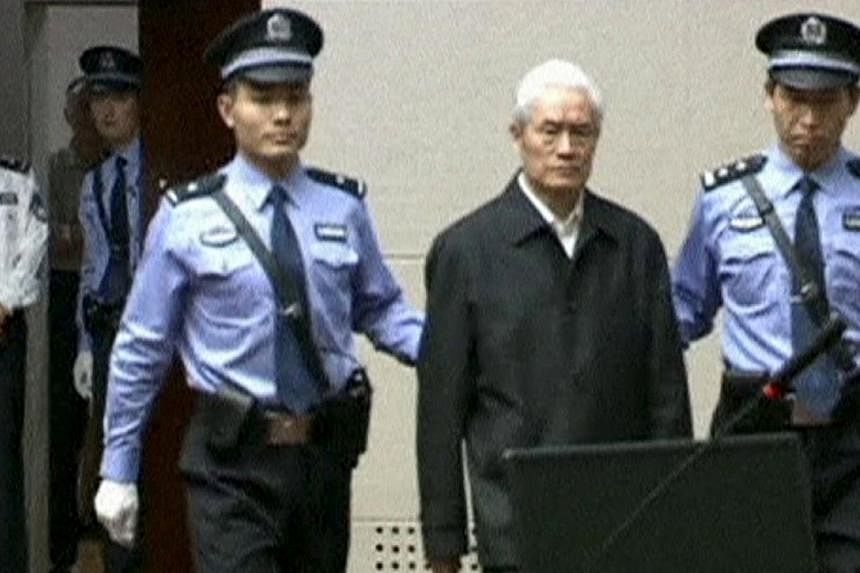XIQIANTOU, China (AFP) - He wielded enormous power as China's fearsome security chief, but at Zhou Yongkang's ancestral village, his relatives' tombs are now backdrops for selfies and curious visitors crush the hedges around the family home.
Zhou, who was jailed for life on Thursday after a secret corruption trial, came from humble beginnings.
Born to an eel farmer in the sleepy community of Xiqiantou, he embarked on a journey through the oil industry to the apex of political authority and a place on the Communist Party's elite Politburo Standing Committee (PSC).
His role heading the Central Politics and Law Commission put him in charge of China's police, courts, jails and domestic surveillance. Shielded from scrutiny by a vast network of lieutenants in China's internal security network, Zhou was seen as untouchable.
But since his career crashed into ignominy as the most prominent target of the Communist Party's much-publicised anti-corruption drive, his birthplace has become a venue for political rubber-necking, rather than respect and deference.
Xiqiantou, outside Wuxi city in the eastern province of Jiangsu, is surrounded by industrial estates and new housing developments, and BMWs and Audis have to slow on the narrow lanes for clattering agricultural vehicles puffing black smoke into the humid air.
The imposing black and white Zhou family compound, complete with a tranquil moat, stands grandly at the centre of the village.
"Hey, see if you can get your camera through there," a man shouted to a group of young women, pointing to a black latticed window on the surrounding wall, before flattening a perimeter hedgerow in his quest for a clear shot.
His friends struck high-spirited poses as they took pictures of each other.
- Huge fortunes -
During a recent visit to the village by AFP, some visitors were more reflective, musing on how the once mighty can fall, as if at a Chinese Graceland.
After months of rumours, the party announced last July that Zhou - who stepped down from the PSC in a once-a-decade leadership handover in 2012 - was being investigated, before he was expelled and arrested last December.
He was sentenced to life in prison on Thursday, after admitting to charges of "bribery, abuse of power and leaking state secrets," according to state media.
The ancestral Zhou tombstones stand next to fields of strawberries around 500m behind the family home.
A freshly erected grave marks the resting place of Zhou Yuanxing, who passed away early last year, as the net closed on his older brother and shortly after his younger sibling Zhou Yuanqing was detained.
Yuanxing was the last of the three brothers to live at the Zhou compound - built in 2008, after the house they grew up in was torn down - residents told AFP, adding that other family members still live in the village.
The two older men both left decades ago, with Zhou Yuanqing becoming a local official. He was taken away by investigators along with his businesswoman wife. Influential magazine Caixin reported the pair had amassed huge fortunes from the web of corruption that surrounded Zhou Yongkang.
Yuanxing was said to have grown rich selling Wuliangye, a spirit from Sichuan - a province formerly run by Zhou Yongkang.
Looking over the memorials one man shook his head.
"There is an old saying in China - 'Evil actions bring evil onto ourselves'," pronounced the man, who declined to give his name but said he had travelled hundreds of kilometres to visit.
"The reason he had to fall is mainly his fault," he added. "He did so many evil things and didn't serve as a good official, so he got himself trapped by his own deeds."
A friend, smiling incongruously as he had his picture taken in front of a tombstone, interjected: "We didn't come here because we like him."
- 'The pride of Xiqiantou' -
Spontaneous street debates regularly erupt among the steady stream of previously unacquainted oglers in Xiqiantou, one of whom reiterated Chinese media reports that Zhou Yuanxing "acted as if he was better than other villagers".
But residents remembered him, and the family, in a different light.
"He was a simple man who rode a bicycle even when he got sick," said a man surnamed Li who lives near the Zhou compound.
The Zhou family were handed agricultural land after the Communists came to power in 1949, he said, and the trio's father worked hard for his sons' future.
"Zhou Yongkang is the son of an ordinary person, someone very poor," he said. "They (the brothers) acted like normal people."
It is a notable contrast to Zhou's nemesis Xi Jinping, the son of a Communist hero who grew up a privileged "princeling" before beginning his progress to the presidency.
"Some senior officials led a much more comfortable life than Zhou," Li said, adding that Zhou was "still the pride of Xiqiantou".
He paused to reflect on a very Chinese game of power politics, before offering his own version of a sentiment variously attributed to George Orwell, Winston Churchill, and Machiavelli.
"Those who win power have the right to decide who are good guys and who are the bad ones," he said.

